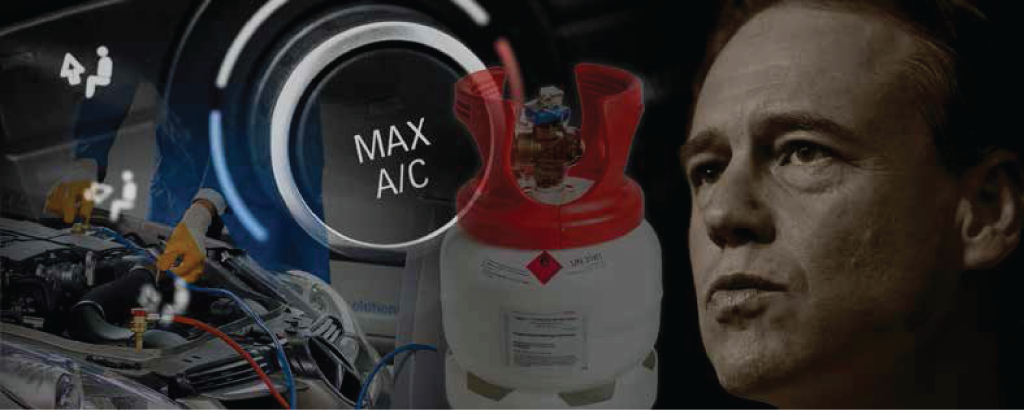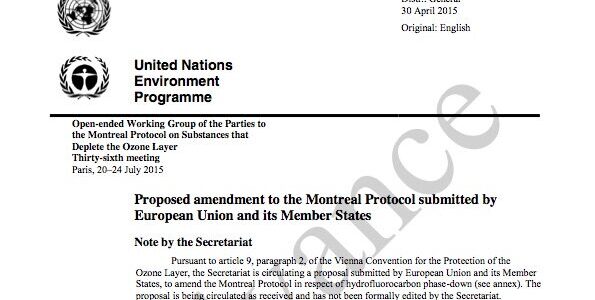Ozone review: Options paper falls short
- PostedPublished 18 December 2015
Rise in licensing and levy costs mooted, but no alternative refrigerant controls
Despite the regulation of all refrigerants under the review of Australia’s Ozone Protection and Synthetic Greenhouse Gas Management (OPSGGM) programme being unanimously desired by industry, the review options paper and supporting documents published by the Department of the Environment in October 2015 give a strong indication that it won’t happen.

Compounding the issue and threatening to implode industry compliance within the OPSGGM programme, the options paper also flags price rises for various license fees and refrigerant import levies because the scheme is “not currently achieving full cost recovery with expenses exceeding revenue”.
Although this is only an options paper and there is still plenty of time for industry to influence the OPSGGM review outcome, the line in the sand drawn by the Department over expanding the scope of refrigerant regulation smacks of missed opportunity – or even reluctance to make meaningful change.
VASA is among the 12 industry bodies in the Technical Working Group (TWG) established to advise the Department during the OPSGGM review process. We, and a number of other TWG participants have repeatedly made it clear to the Department that regulation of all refrigerants is not just desired, but crucial to the harmonious operation of our industry.
The impacts of unlicensed people using hydrocarbon refrigerants, operating outside the regulatory framework the rest of us are bound by, are well known by VASA members.
Increasing the licensing cost burden is only going to discourage more people from being licensed, especially if the increased cost is not offset by the knowledge that all your competitors, regardless of which refrigerant they use, are also contributing to the licensing scheme, governed by the same rules and equally subject to audits of their operations.
And the Department clearly knows this, for the following text is included in the options paper: “Emission reductions achieved through the end use system would be eroded as businesses would be forced to reduce their standards to compete with businesses that chose to not operate to international standards and codes of practice in the absence of a regulatory requirement to do so.”
The options paper also suggests that refrigerant import levies be looked at with a view to achieving cost recovery. Of course those levies only apply to the same gases for which an ARCtick license is required, so the price of gas will go up too and retrofitting with hydrocarbons becomes even more tempting.
Licensed businesses and people doing the right thing are already subjected to unfair competition from those skirting around the rules. For too many, business has been bad enough for them to resort to the old adage of, ‘if you can’t beat them, join them’.
Worse, some loophole jockeys have already caused disproportionately disruptive impacts for not only the rest of the industry but Refrigerant Reclaim Australia (RRA), a world-leading national treasure that does great work in cleaning up after us by collecting and safely destroying our unwanted refrigerant.
At numerous points in the options paper, the Department proves a thorough understanding of industry concerns about the current inequitable regulatory situation, proving it has been listening, but ultimately it only sees barriers, rather than opportunities, in implementing the desired solutions.
It all comes down to the fact that OPSGGM legislation, and it’s obvious by the name, is pretty much exclusively aimed at reducing the emissions of ozone-depleting and synthetic greenhouse gases. And rightly so.
But these rules do not account for the fact that new, less environmentally harmful substances are now on the market and some are increasingly being used by people taking advantage of the loopholes without proper regard to the fact they all come with additional health and safety considerations, be they flammability, toxicity or high operating pressures.
It is understandable that old rules struggle to cope with disruptive new technologies – the Uber ride-sharing phenomenon is a prime example – but surely when the rules are reviewed there must be a greater effort to restore balance and close problematic loopholes that threaten to undermine the entire licensing system.
Even the lobby group representing hydrocarbon refrigerant companies publicly supports the licensing of all refrigerants.
At the heart of all this is the Department’s position that it is hamstrung by constitutional limitations from both broadening the coverage of refrigerants and taking some responsibility for safety, but it could be argued that this has not prevented the Commonwealth and states or territories from coordinating and harmonising the regulation and licensing of other industries, such as construction and energy, using mechanisms such as the Council of Australian Governments.
One clue as to the Department’s reticence to think outside the box as to how it can achieve desired industry outcomes by regulating beyond the original environmental remit of OPSGGM legislation could be the wider governmental deregulation agenda.
Throughout the options paper is language relating to reducing the administrative or regulatory “burden” on business. In fact, wording in the options paper and supporting documentation reveals a desire for future industry self-regulation and the eventual end of the Department’s – and ARC’s – role in the refrigeration and air conditioning industry.
So is industry’s desire for broader refrigerant coverage under OPSGGM at odds with this deregulation agenda? No, because fixing the problems would reduce the overall burden for those determined to do the right thing in today’s broken regulatory environment.
The same goes for safety. New risks have been introduced, and will continue to be introduced, as alternative refrigerants enter the market. The Department knows this and even commissioned an independent report into it – but in the options paper the Department passes the buck:
“In administering the OPSGGM Programme the Australian Government seeks to avoid exposing technicians to any additional WHS risks. However, it is critical to note that the power and responsibility to regulate occupational matters – including WHS – rests with state and territory agencies.”
Work health and safety may well be the responsibility of the states and territories, but the Commonwealth also has a duty of care to manage safety issues relating to compliance with the regulations it puts in place. The Department needs to try harder in at least satisfying industry that it takes these responsibilities seriously.
Under the OPSGGM review, the phasedown of HFC refrigerants such as R134a and the banning of equipment using those refrigerants is all but inevitable, along with enforced or improved maintenance and leak detection. VASA and the industry at large wholeheartedly supports this, and the Department’s analysis shows it will save taxpayers money.
However the among the Department’s costings for the HFC phasedown assume “zero” cost for the training of technicians in the new regulations, reasoning that they can read about it in the ARC’s Cool Change newsletter.
Firstly, the Department overestimates how many people actually read Cool Change or other industry newsletters and secondly, underestimates the amount of retraining required considering the change to working practices required in handling low global warming potential refrigerants that flammable, toxic or require high operating pressures.
The Department also omits to mention (or perhaps consider) that the cost of this training burden will be placed on industry.
So it is clear that much work must be done to turn the currently precarious Ozone Review process around. SightGlass News understands that the options paper has drawn a strong response from not just a broad range of industry bodies including VASA, but a number of companies too.
This is a once-in-a-generation opportunity. We owe it to the next generation not to stuff it up. From day one, VASA has been at the forefront of the process and will continue fighting in the hope that common sense prevails.
- CategoriesIn SightGlass
- TagsHFC phase down, Ozone Act review, SightGlass News Issue 4




